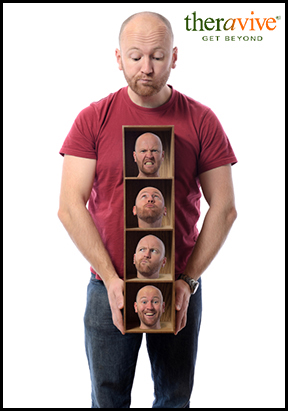 There are a lot of issues that are being focused on in the news today, and it's important to take a look at them so that we can better understand them and what they do to the people who are dealing with them. One type of mental illness that has gotten a lot more focus as of late is the category of personality disorders. Personality disorders are a category of disorders that have certain traits, but each of them are different as well. In this article, we're going to look at the general definition of personality disorders, then take a brief look at the types that are currently in the most recent edition of the Diagnostic and Statistical Manual (DSM; the manual used by mental health professionals to diagnose and treat mental illness), so that you can understand them better.
There are a lot of issues that are being focused on in the news today, and it's important to take a look at them so that we can better understand them and what they do to the people who are dealing with them. One type of mental illness that has gotten a lot more focus as of late is the category of personality disorders. Personality disorders are a category of disorders that have certain traits, but each of them are different as well. In this article, we're going to look at the general definition of personality disorders, then take a brief look at the types that are currently in the most recent edition of the Diagnostic and Statistical Manual (DSM; the manual used by mental health professionals to diagnose and treat mental illness), so that you can understand them better.
What Is a Personality Disorder?
This is a huge question, and it has taken a long time for the mental health world to nail down a definition of the term. In short, a personality disorder is a disorder where someone has a way that they think about things, and in that way of thinking about things, they develop unhealthy patterns of living and functioning. But, those unhealthy ways of thinking cannot be changed easily - they seem to be ingrained in the being of the person who is struggling with them and they end up affecting themselves and others in a negative way.
One thing that is incredibly difficult about personality disorders is that it may take a while to start and find them, even if you are in therapy or getting help in other ways. It's "how you think." It's absolutely normal to you, so you don't think anything of it because you believe that it is "the way that you are." This, of course, makes it difficult to treat it at first as well, and it may take a lot of time to be able to correct those patterns of thinking before you can break free of it.
It takes a lot of change and time in order to be able to start getting on the right path to healthy thinking patterns. Behavioral therapy and psychoanalysis from a professional is absolutely necessary because it's hard to break fee from these negative patterns of thinking on your own and without the help of a professional that can guide you toward wholeness and healthiness. Each one is different, and each person will have a different way to deal with the types of disorders that they may be dealing with on a regular basis. That's why it's important for you to get help and guidance if this sounds like it may be you.
What Are the Types of Personality Disorders?
There are a number of different disorders that fall under the category of personality disorders. In this section, we're going to take a very brief look at each of them so that you can better understand what they are, how they affect the person, what they do to the person, how it may affect those around them, and the help that may be available for the person that is struggling with the personality disorder. The types of personality disorders include the following:
"Cluster A" disorders - Eccentric disorders - includes schizoid, paranoid, and schizotypal personality disorders. This category of disorders falls under the paranoia and multiple personality disorders. These disorders usually involve not trusting other people (especially with paranoid disorder), whereas the schizoid and schizotypal disorders seem to be distant from reality, where the person may be trapped in their own mind and struggle with determining the difference between what is real and what is in their imagination. Like with paranoid disorder, the schizoid and schizotypal disorders also have a level of distrust for other people, which usually results in an avoidance of close relationships and an inability to interact with others in a healthy way. Those with schizoid personality disorder are usually more functional than those with the other two Cluster A types of personality disorders, but they still struggle with a number of tasks. Many people see these people as "odd," "eccentric" or "bizarre" (hence the nickname of this cluster) and may have difficulty interacting with them in a standard, healthy manner.
 "Cluster B" disorders - Erratic disorders - includes narcissism, borderline (BPD), antisocial, and histronic personality disorders. This category of disorders is well known, specifically because it includes borderline personality disorder, which is fairly common. In short, this category of disorders has to do with how people interact with the outside world and with how their behaviors may be kind of "erratic" (hence the nickname of the cluster). They could act one way at one time, and then the next time that you talk to them, they could end up being totally different. With BPD, people have fear of abandonment and they have a bit of detachment from who they are and what they are doing with their lives. People with BPD often feel lonely and empty. Antisocial disorder differs because these people often have no care for how they treat other people and what they are saying to them on a regular basis. They may say rude and callous things without thinking about how the other person will react. With histronic personality disorder, people seem to have lost who they are and they are instead "playing a part" in order to try and please other people. This often leaves them feeling empty and lacking any self worth that they need in order to function in a healthy way. Lastly, we have narcissism, which is where people do not have any care or empathy for others, they envy other people and they try to do everything possible in order to get people to envy them. As you can see, this category is based on how people interact with others in an unhealthy manner and some of the results of these disorders can be hurtful and dangerous for everyone that is involved.
"Cluster B" disorders - Erratic disorders - includes narcissism, borderline (BPD), antisocial, and histronic personality disorders. This category of disorders is well known, specifically because it includes borderline personality disorder, which is fairly common. In short, this category of disorders has to do with how people interact with the outside world and with how their behaviors may be kind of "erratic" (hence the nickname of the cluster). They could act one way at one time, and then the next time that you talk to them, they could end up being totally different. With BPD, people have fear of abandonment and they have a bit of detachment from who they are and what they are doing with their lives. People with BPD often feel lonely and empty. Antisocial disorder differs because these people often have no care for how they treat other people and what they are saying to them on a regular basis. They may say rude and callous things without thinking about how the other person will react. With histronic personality disorder, people seem to have lost who they are and they are instead "playing a part" in order to try and please other people. This often leaves them feeling empty and lacking any self worth that they need in order to function in a healthy way. Lastly, we have narcissism, which is where people do not have any care or empathy for others, they envy other people and they try to do everything possible in order to get people to envy them. As you can see, this category is based on how people interact with others in an unhealthy manner and some of the results of these disorders can be hurtful and dangerous for everyone that is involved.
"Cluster C" disorders - Fear based disorders - OCD, Avoidant, and dependency personality disorders. Cluster C contains personality disorders that may have a basis in anxiety issues. Many people with these disorders will have them paired with anxiety disorders like social anxiety and generalized anxiety disorder. Obsessive compulsive disorder, or OCD, is a disorder that causes people to become obsessed with something specific, and if they do not go through the motions or patterns before doing something, it can cause them major anxiety. These are the people that you hear about that wash their hands 15 times every hour or have to have their room a certain way or they get really freaked out. Avoidant personality disorder is all about rejection - if the person feels like they could be rejected or that they are in a situation where they can fail, they avoid the situation entirely. They don't take any risks and they worry about everything related to relationships. Many believe that avoidant personality disorder is the result of childhood trauma that is related to rejection and failure. Last but not least, dependency disorders occur when a person has no self confidence of their own and depends on the affirmation of others in order to feel like they have any worth at all; they put their future in other people's hands because they worry that there is no way for them to take care of it on their own.
Obviously, you can't diagnose yourself, but if you believe that you or someone that you love may be struggling with a mental illness, like a personality disorder, you need to get help from a qualified professional. By using our website, you can find a number of professionals who can help you to start your journey toward a whole, healthy life that is full of all of the things that you want and deserve out of it. Get the help that you need today; you don't have to walk through it alone, there is hope and you can break free from the power that mental illness may have in your life.
_________________________________________________________________________________________________________________________
Burton, N., MD. (2012, May 29). The 10 Personality Disorders. Retrieved July 14, 2014, from http://www.psychologytoday.com/blog/hide-and-seek/201205/the-10-personality-disorders
Grohol, J. M. (2013, July 16). Personality Disorders and Personality Traits. Retrieved July 14, 2014, from http://psychcentral.com/personality/
Mayo Clinic Staff. (2014, January 31). Personality disorders. Retrieved July 14, 2014, from http://www.mayoclinic.org/diseases-conditions/personality-disorders/basics/definition/con-20030111
Mental Health America. (n.d.). Personality Disorder. Retrieved July 14, 2014, from http://www.mentalhealthamerica.net/conditions/personality-disorder
Merrill, D. B. (2012, October 11). Personality disorders. Retrieved July 14, 2014, from http://www.ncbi.nlm.nih.gov/pubmedhealth/PMH0001935/
About the Author
 Marti Wormuth, MA
Marti Wormuth, MAMarti has a Bachelor’s Degree in Sociology and a Master’s in Communication Studies. Her favorite activities include reading, playing games, and hanging out with the students at her church. Marti volunteers with the youth ministry at her church as a teacher and mentor. Because of this, she recently started another degree, her graduate certificate in student ministries. She considers her current graduate work to be a stepping stone to becoming a youth pastor or a published author.
Professional Website:
martis-miscellany.com/